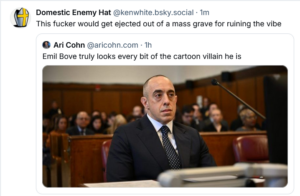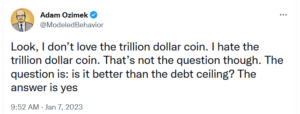Steve Vladeck has a summary of DOJ corruption under Trump:
There isn’t enough electronic ink to fully summarize the background of the Eric Adams saga. To make a very long story short, the 110th Mayor of the City of New York was indicted last year by federal prosecutors on one count of conspiracy to receive campaign contributions from foreign nationals and commit wire fraud and bribery; two counts of soliciting campaign contributions from foreign nationals; and one count of soliciting and accepting a bribe. In essence, the indictment claimed that Adams received more than $100,000 worth of free plane tickets and luxury hotel stays from wealthy Turkish nationals and at least one government official over the course of a decade.
Trump’s AG, Pam Bondi, and one of here deputies, Emil Bove, are attempting to stop the prosecution. It’s a straight up quid pro quo to enlist Adams’ assistance with deportations. Towards that end, they directed the lead prosecutors in the NY US Attorney’s office – Trump appointees themselves! – to drop it. Their direction was so egregiously unlawful that the prosecutors quit:
What’s striking about this is not just how transparent what’s actually happening is; it’s Bove’s candid admission, in today’s letter, that “the policies of a democratically elected President and a Senate-confirmed Attorney General” take precedence over a Justice Department lawyer’s oath … to the Constitution. It would be one thing if Bove argued that the President’s (or Attorney General’s) interpretation of the Constitution takes precedence over that of an Interim U.S. Attorney. But that’s not even his argument. Rather, it’s that Sassoon (who, although it shouldn’t matter, is a Republican who clerked for Justice Scalia) had no business raising to the Attorney General her view of what the law required in a case in which it conflicts with the political preferences of the President—indeed, that it was “insubordinate” for her to do so.
My original post follows below the break but Vladeck’s write-up is much better.






This half-finished post from mid-2017 is a reaction to Russ Roberts’ commentary, The Human Side of Trade. Apologies for the listicle.
Roberts: “Suppose a scientist invents a pill that once you take it lets you live until 120 with no health issues whatsoever. Once you turn 120, you die a peaceful death on your birthday.”
Such a pill would fundamental change the nature of what it means to be human. Economics aside – and even if the economic impacts were all positive – the pill he describes strikes me as an awful invention.
Related reading: “Being Good Enough” by Bill McKibben – http://dark-mountain.net/blog/key-posts/dark-mountain-issue-8-techne-2/
I admit that I stopped reading Roberts’ piece after he introduced the magic pill scenario. But, trooper that I am I went back to it. Wow, it got even worse after where I left off. A few thoughts:
1. I have no more in common with Roberts than I do with people who believe that the Bible is literal truth. The man is not short on hubris.
2. A joke I heard 25+ years ago: President Gorbachev was visiting a farm one day and a peasant asked him a question, “Comrade Gorbachev, was Comrade Lenin an experimentalist or a theoretician?” Gorbachev pauses then replies to the effect of “Perhaps both.” The peasant responds definitively, “No. He was a theoretician. An experimentalist would have tested Communism on rats first.” Roberts is also a theoretician.
3. Reading pieces like Roberts’ gets me thinking that Christopher Lasch had it right.
4. Roberts writes: “In 1900 about 40% of the American work force was in agriculture. Now it’s about 2%… Having only 2% on the farm is a feature, not a bug. It’s a good thing. It’s a glorious thing.” That only 2% work in agriculture implies that 98% of the population have no concept of how to feed themselves if their lives depended upon it which, coincidentally, if there were a major disruption in the food chain it would. That does not strike me as a glorious thing.
5. One can have too much of a good thing. There is a tension between efficiency and resilience. Efficiency feels good and, so long as everything runs smoothly, it’s great. However be aware of the “The better your four-wheel drive the further you’ll be from civilization when you get stuck.” effect. If you ignore resilience in pursuit of efficiency then you set yourself up for a nasty failure.
6. Doctors, nurses, chemists, etc wouldn’t be put out of work immediately because people like myself would want nothing to do with that pill. We’d die off eventually but demand for people working in health-related professions wouldn’t immediately go to zero.
7. Is it important to deal with adversity in your life? Would the magic pill make us soft psychologically? If it did would it matter?
8. Take the pill and no health issues for 120 years but you’re dead on your 120th birthday? I suppose some people really like for their lives to be as deterministic as possible.
9. Roberts writes: “I once debated NAFTA on the south side of St Louis surrounded by autoworkers who were threatened by open trade with Mexico. A machinist, who happened to be the brother of the guy I was debating told me had already been out of work for years. “What are you going to do for me?” he asked. I didn’t tell him to find comfort from the fact that his children were going to lead better lives. I wasn’t sure what to tell him. So I asked him what he wanted. Did he want a check? He said “I want my job back.” He said he wanted his job back, but what I think he really wanted back was his pride and dignity.”
How do children of the long-term unemployed fare relative to those whose parents have steady work? I’m guessing that the stress of parents worrying about how they’re going to pay the mortgage or rent or buy food doesn’t have a positive effect on their kids. Just sayin’…
Maybe that machinist really did want his job back. The work may have been particularly satisfying to him. Maybe pride and dignity was it but don’t dismiss the particulars of the work itself.
10. I recommend Samuel Florman’s essay, Nice Work